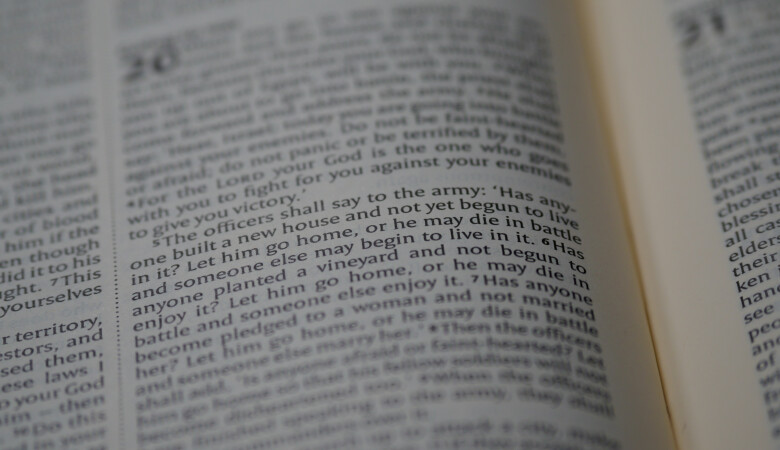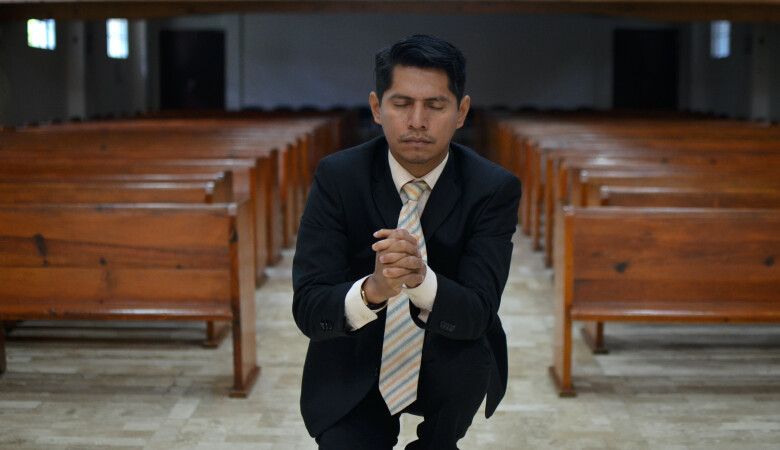Abraham and Abimelech at Beersheba
September 26, 2004 | Andy Davis
Genesis 21:22-34
sermon transcript
Introduction
When you think of eternity, what comes to mind? It is hard for us finite creatures to get our thoughts around eternity. Some time ago, I read a survey of history from a secular writer who was grappling with eternity. He came up with an analogy of a mountain in a vast plain. Once a day, a sparrow came from a horizon far away, and would take away from this huge mountain a single pebble and drop it into the ocean. The next day, it would do the same. When the mountain had been leveled to the the plain, that was one day of eternity. That is a secular writer trying to grapple with the infinitude of time.
The Bible talks about God as an eternal God. Our text says that Abraham called on Yahweh, or the Lord, El Olam, the God of eternity. What an incredible title that is for God. The text speaks in a very plain and simple way of a covenant, an agreement, a treaty between two persons, between Abimelech and Abraham concerning a well and the relations that they would have in an ongoing sense.
We have this immense, eternal God, and this rather mundane interaction between two people in every day life. That is the mystery of life for us as Christians — eternity into time. In our everyday business, tasks, relationships, work here in this world, we call on Yahweh, El Olam, the eternal God. The connection of the two in this passage is in another verse, Hebrews 13:20: “May the God of peace, who through the blood of the eternal covenant brought back from the dead our Lord Jesus, that great Shepherd of the sheep, equip you with everything good for doing his will…” This text in Genesis 21 is about a temporal covenant made in the eyes of an eternal God, but it is a picture of the blood of the one eternal covenant that saves our souls.
The Father and the Son made this agreement before time began, from eternity past, before there was a sun or a moon or stars, by which we set time. Before any of that happened, there was an agreement between the Father and the Son — that is the eternal covenant — that if the Father would give the beloved ones to the Son, the Son would pour out His blood for them. He would die in their place, and make for them an eternal resting place. Simply put, the eternal covenant benefits aliens and strangers and pilgrims. Abraham lived in Abimelech’s land. The king wanted to remind Abraham that Abraham was living on his land by temporary covenant, that Abraham dwelt in the land of the Philistines as an alien and a stranger, passing through. But the covenant made on your behalf to give you a resting place is eternal, if you are a believer in Christ. Jesus said [John 14:20-3], “My Father’s house has many rooms; if that were not so, would I have told you that I am going there to prepare a place for you? And if I go and prepare a place for you, I will come back and take you to be with me that you also may be where I am.”
That is what the eternal covenant is all about. The seven ewe lambs were a sign or a witness between Abraham and Abimelech that the well belonged to Abraham. So also the blood of Christ is a sign and witness to us that God eternally has determined to bring believers in Christ to Himself, that we would have an eternal resting place. All the rest is details which are interesting, but it is the eternal covenant that I trust in for my salvation, that I am resting in. The tamarisk tree that Abraham planted and the well that they bickered over are gone. Life is flying by; time is moving on. Every week brings us closer to Judgment Day. Every week, we age, we see material things around us become old and decrepit and we have to replace them. Trees that are planted die, but there is an eternal God who has made for us an eternal covenant in Christ, and He is saying that some day we will be with Him in paradise. I look forward to that.
Abraham’s Mixed Witness
Abimelech’s Spiritual Observation
The context in Genesis 21 is of God’s faithfulness in keeping His word to Abraham and Sarah. At the beginning of the chapter, God fulfilled this promise at last, and little miracle baby Isaac was born. God also fulfilled His promise to Ishmael, that He would protect him and care for him, even though he was cast out from the family at God’s command. He and his mother Hagar went out into the desert where God provided and protected Ishmael. Isaac and Ishmael had different promises, but we see in both cases, God faithful to fulfill His promise — He is faithful to His word.
However, even the best of God’s people are not faithful to their word. The Scripture says, “All men are liars.” Abraham was now eating the fruit of his past behavior with Abimelech. He had told him a lie. He had a mixed witness to him. Abimelech could look at his life and see God’s hand of blessing on it, but he also remembered how Abraham behaved when he lied about Sarah, saying she was his sister. That almost got Abimelech killed.
God in Genesis 20 spoke to Abimelech who was considering taking Sarah to be his wife based on the word that Abraham had given him that she was his sister. He was going to take her, but already God’s hand of curse was on Abimelech and his household. They were physically ill with physical problems such that the women could not conceive and bear children. God warned Abimelech in a dream saying, “You’re as good as a dead man because of this woman that you have taken because she is another man’s wife.”
Then Abimelech called Abraham in and said, “What is this you have done to me? You have done things to me that ought not to have been done, you lied to me.” As he sought to make a treaty, the mixed witness and the results of it here are having their effect. Verse 22 says, “At that time Abimelech and Phicol the commander of his forces said to Abraham, ‘God is with you in everything you do.’” That is the good part.
Abimelech’s Painful Memory
But then he says in verse 23, “Now swear to me here before God that you will not deal falsely with me or my children or my descendants.” That is the bad part. Abimelech was asking Abraham not to lie to him anymore, to deal well with him. Abimelech feared Abraham, and he knew that God was with him and could wipe Abimelech out. Abimelech knew He is a powerful, eternal God. He did not trust Abraham, but he saw God’s hand of blessing. That is a mixed witness.
What did he mean when he said, “God is with you in everything that you do?” Isaac had been born already. This must have been a very striking testimony to Abimelech who knew Abraham’s family well, that they had no child, that Sarah was an aged woman at this point, 90 years old and beyond, and Abraham 100 years old. They had had no children all those many years, and now here was miracle baby Isaac. Abimelech recognized that this could not happen except that God was with Abraham in everything that he did. He also saw at a lesser level the material prosperity of Abraham’s life — the cattle and sheep, the possessions, the silver and gold. Abraham was a wealthy man, and there was the principle of blessing.
We do not have record of Abraham’s conversations with Abimelech, but perhaps they had time to talk about the visions and the promises that God had made to Abraham. When Abimelech said God was with Abraham in everything he did, there was a history there. That is the good witness that Abraham presented. “My God is a powerful God — He is a promise-making God, and He is a promise-keeping God.” Now he had a baby to prove it, after waiting for 25 years since God first called him to that land to roam. Abimelech saw God’s hand in everything, but he also remembered his problem with Abraham and asked him not to deal falsely, to deceive, to lie to him anymore, but to deal well with him.
Abimelech’s Desire
Abimelech desired a treaty of covenant with Abraham. Verse 24 says, “Show to me and the country where you are living as an alien the same kindness I have shown to you.” He reminded Abraham of the kindness he had shown in letting him live in his land, that he was a guest there. At the same time, he introduced Abraham to Phicol, the commander of his army. Was he there only as a friend and witness to the covenant? No, most likely it was to give Abraham the sense that Abimelech was not bargaining from an inferior position.
There was a concern there. Abraham is reminded once again, as Stephen said to the Sanhedrin concerning the land and concerning Abraham in Acts 7:5: “[God] gave him no inheritance here, not even a foot of ground. But God promised him that he and his descendants after him would possess the land.” He gave Abraham nothing. Everywhere he went, he lived in tents. He roamed through the land, a stranger and an alien in Philistine land. It says concerning Abraham, Isaac and Jacob in Hebrews 11:13-16: “All these people were still living by faith when they died. They did not receive the things promised; they only saw them and welcomed them from a distance. And they admitted that they were aliens and strangers on earth. People who say such things show that they are looking for a country of their own. If they had been thinking of the country they had left, they would have had opportunity to return. Instead, they were longing for a better country — a heavenly one. Therefore God is not ashamed to be called their God, for he has prepared a city for them.”
Abraham’s Oath of Friendship
Abimelech was saying, “Please do not forget that you are here at my leave, as my guest. Show me the same kindness that I showed to you and swear an oath or a treaty of covenant friendship with me.” Abraham said simply, “I swear it.” He made a covenant oath, which was sacred to both Abimelech and to Abraham, performed in a solemn ceremony of covenant oath-taking. Hebrews 6:16 says, “…the oath confirms what is said and puts an end to all argument.”
Abraham’s Complaint
An Alien with a Grievance
However, there was still a matter to be discussed. Abraham brought a complaint to Abimelech — even though he was an alien and a stranger, he still had a grievance: “Then Abraham complained to Abimelech about a well of water that Abimelech's servants had seized.” This well Abraham had commissioned was his by rights, and when Abraham made this treaty with Abimelech, he testified to this very fact when he said, “Accept these seven lambs from my hand as a witness that I dug this well.”
This was a significant issue to Abraham. In my opinion, it was the issue that brought Abimelech and Phicol there to begin with, even though Abimelech said in verse 26, “I don’t know who has done this. You did not tell me, and I heard about it only today.” Whether Abimelech was lying to Abraham or had only heard that specifically who had done it and what the issues were, this was a very serious matter. In the Negev, in the desert, where they were living, water was life. Wars have been fought between desert tribes over wells of water, so this was a brewing conflict between Abraham and Abimelech. Phicol the commander of the Philistine army was there, but Abraham had his army too. He had defeated undefeated Kedorlaomer and had 318 men he could put on a horse at that point. But those 318 men did not mean a thing. What mattered was that God was with Abraham in everything he did, and Abimelech saw the promise of blessing in Abraham’s life. Abimelech was saying he did not want to fight Abraham over the well and wanted instead to make a treaty — a covenant and a friendship.
A Serious Matter
The search for water is a fascinating one. Historically, diviners have used rods, sticks in the shape of an upside down capital Y. They walk around holding the top of the Y in both hands, and where the stick bends down, supposedly there is water underground. Joseph Smith, the founder of Mormonism, was a water diviner before he found a better line of work founding a mythological religion called Mormonism. He sold his services to search for water. One can never be quite sure where subterranean water is, and it is difficult and expensive to dig or drill a well. Once water is found, it is life itself — better than finding hidden gold in the desert, because gold cannot sustain life. It seems that Abimelech’s servants — his soldiers or some of his men — had taken over this well and were not letting Abraham use it. This was a very serious matter.
I read recently about a French scientist named Alain Gaché working in the desert of Chad. He uses space age technology, a certain kind of radar that reads 60 feet below the surface of the earth which can find subterranean water. The space shuttle has made a topological map for him, and he has put the coordinates in his GPS. He has found water with 100% accuracy and dug six wells. This is important because right now in the Darfur region of Sudan, there is a terrible civil war, and there are 200,000 refugees out there in that desert in Chad. This is literally life for those refugees, many of whom are our brothers and sisters in Christ. They are suffering and dying because of the conflict in Sudan.
About 300 years before the time of Christ, there was an oft-forgotten kingdom called the Nabataean empire, Arab in descent. They traveled through the desert and whenever threatened, for example by the Romans or the Greeks, they could retreat into the Negev, the desert region we are looking at today. No one could follow them there, because they had a genius for finding subterranean water and digging wells and cisterns to collect rain. They would then cover them over so that they could not be detected. They had certain signs and symbols that they alone knew so that they could water their animals and themselves to survive, but no one following them into the desert could survive. Water is life in the desert.
Abimelech’s Declaration of Ignorance
As before, Abimelech declared ignorance. Verse 26: “But Abimelech said, ‘I don't know who has done this. You did not tell me, and I heard about it only today.’” Abimelech took it very seriously, and he dealt with it seriously, which is why he wanted a treaty of friendship with Abraham, for he feared the God of Abraham.
The Treaty at Beersheba
A Covenant and a Return Gift
In verses 27-32, the two seal the treaty of Beersheba: “So Abraham brought sheep and cattle and gave them to Abimelech, and the two men made a treaty. Abraham set apart seven ewe lambs from the flock, and Abimelech asked Abraham, ‘What is the meaning of these seven ewe lambs you have set apart by themselves?’ He replied, ‘Accept these seven lambs from my hand as a witness that I dug this well.’ So that place was called Beersheba, because the two men swore an oath there. After the treaty had been made at Beersheba, Abimelech and Phicol the commander of his forces returned to the land of the Philistines.”
So this matter was sealed with a covenant. The covenant was a binding solemn agreement between two or more parties. Baptists, unlike Presbyterians, do not think a lot about covenants, but we should. Hebrews 13:20 says that we were saved by the blood of an eternal covenant, an agreement between the Father and the Son. No matter what we believe about infant baptism or the covenant theology, we are saved by that covenant, the eternal covenant. Throughout the Old Testament especially, we see covenants coming in again and again. This was more of an everyday covenant concerning the well and the relationship that there would be between Abraham and Abimelech.
To seal it, Abraham gave a return gift of livestock, seven ewe lambs. They were probably part of the original gift that Abimelech had given to Abraham, and he was willing to give back some of it, so that there would be a good relationship between the two.
It was a seven-fold witness — the seven lambs were set off as a special sign, to say that every time Abimelech looked at these lambs or their offspring, he would remember that Abraham dug the well. The meaning of the name of the place, Beersheba, is slightly unclear — either “well of the seven” or “well of the oath”, but either way, the name commemorated the covenant of friendship between Abraham and Abimelech.
The Future of Beersheba
In Genesis 26, the exact same thing will happen again over the same well, but between Isaac and Abimelech and Phicol. Beyond that, it would be included in the land that Joshua conquers, and would become part of the Promised Land. Some day, Abraham’s descendants would own Beersheba. 1 Samuel 3:20 says, “And all Israel from Dan to Beersheba recognized that Samuel was attested as a prophet of the LORD.” From Dan to Beersheba, all the Jews assembled and made David their king. Dan was the furthest north, and Beersheba, on the Negev, the furthest south. This well was part of the Promised Land.
Having made the covenant, Abraham planted a tamarisk tree. Genesis 21:32-34 says, “After the treaty had been made at Beersheba, Abimelech and Phicol the commander of his forces returned to the land of the Philistines. Abraham planted a tamarisk tree in Beersheba, and there he called upon the name of the LORD, the Eternal God.” This would be an oasis of rest for a weary pilgrim like Abraham and his household. The tamarisk is a desert dwelling tree with narrow leaves; it does not have much surface area, so not a lot of water evaporates off, and it can stay green 365 days a year. It is a great desert dwelling tree, and it provided shade in a shadeless place for Abraham. The tree was a symbol of permanence in an impermanent world for Abraham, so it symbolized Abraham’s sense of rest and peace and security in his pilgrim life.
Finally, verse 34 says, “And Abraham stayed in the land of the Philistines for a long time.” He lived there for a long time, but it was still the land of the Philistines.
The Future of Abimelech and the Philistines
Who Were the Philistines?
This encounter with Abraham and Abimelech is the first time we meet the Philistines in the Bible. The Philistines are a major player in the book of Judges, and then in the books of Samuel, with David, with Saul and with Samuel. Originally the Philistines came from a place called Caphtor. Amos 9:7 says, “‘Are not you Israelites the same to me as the Cushites?' declares the LORD. ‘Did I not bring Israel up from Egypt and the Philistines from Caphtor?’” Archaeology has shown that Caphtor is probably the Island of Crete in the Eastern Mediterranean, but also that the pattern of lifestyle of the Philistines — the way they made pottery, their language and their entire system — was similar to the Mycenaeans and the Peloponnesos. Mycenae is where the wars with Troy originated. King Agamemnon and Helen of Troy and Achilles were Mycenaean.
It is fascinating that they would fight battles in the same way. When they faced another army, they would send out their champion, and the other side would send out their champion, and the two of them would fight it out. Whoever won would seal victory for their entire army — it was all down to the two champions. In 1 Samuel 17:4-10, “Goliath stood and shouted to the ranks of Israel, ‘Why do you come out and line up for battle? Am I not a Philistine, and are you not the servants of Saul? Choose a man and have him come down to me. If he is able to fight and kill me, we will become your subjects; but if I overcome him and kill him, you will become our subjects and serve us.’ Then the Philistine said, ‘This day I defy the ranks of Israel! Give me a man and let us fight each other.’” It all came down to hand-to-hand combat between two individuals. That is very Mycenaean, very Greek. That is what the Philistines were. Praise God for David, who came out in the name of the Lord and took a sling and down went Goliath. Unlike Achilles and Hector, he did not drag his body around. He beheaded him and kept the head as a symbol of his victory.
Philistines Could Have Been Blessed
This is significant because the Philistines were constant enemies of the people of God, but it need not have been that way. In Genesis 15, God listed the names of the nations that would be wiped out to a person by the Israelites when they came in and took the land. The Philistines were not included among them. The Philistines could have lived in peace and under the blessing of the God of Abraham, Isaac and Jacob. God said when He called Abraham, “I will bless those who bless you, and whoever curses you, I will curse.” Abimelech and Phicol blessed Abraham, and as a result, they received a blessing. The blessing was that while Abraham’s family was still around — Isaac’s twin sons, Jacob and Esau, were 12 years old in Genesis 26 — they would have long life, long rain, peace and security. That is what God did for those Philistines.
God Keeps His Promises... and His Warnings
But at some point, they became enemies of the people of God, and came under the judgment of God as a result. Jeremiah 47:4 says, “The LORD is about to destroy the Philistines, the remnant from the coasts of Caphtor.” God means what he says. That is what Genesis 21 is all about. What God says, He means. He keeps the promises he makes and He upholds the warnings he gives. If you make a treaty of friendship with Him through faith in Jesus Christ, He will give you eternal life, but woe to you if you oppose his Son. Our God is a promise-making and a promise-keeping God.
The Eternal God
The final note in this text is this issue of the eternal God. Genesis 21:33 says, “Abraham planted a tamarisk tree in Beersheba, and there he called upon the name of the LORD, the Eternal God.” Yahweh El Olam, “our God is an eternal God.” That means He is timeless. He is changeless. What God’s omnipresence is to Him concerning the boundary of space, His eternity is concerning the boundary of time. He never changes. He never dies. He lives forever and ever. He is the eternal God. Therefore, the name Yahweh is The Great I Am. He says, I AM. Jesus said, “Before Abraham was born, I AM.” It says in the book of Revelation, “He is the God who is, and who was, and who is to come.” He is the Almighty. This is the eternal God.
Humanity is bound by time, just as we are bound by space. We cannot be in more than one place at one time, and we cannot see what will happen even the next instant. We do not know anything about the future. But God sees the beginning from the end and the end from the beginning. He is the eternal God. We mark time by the passing of events, but God does not. About 500 years later, a descendant of Abraham named Moses wrote a beautiful Psalm. Psalm 90:1-4 says, “Lord, you have been our dwelling place throughout all generations. Before the mountains were born or you brought forth the earth and the world, from everlasting to everlasting you are God. You turn men back to dust, saying, ‘Return to dust, O sons of men.’ For a thousand years in your sight are like a day that has just gone by, or like a watch in the night.”
Moses traveled from place to place with the people of God before they entered the Promised Land. Like Abraham, Isaac and Jacob before him, he was a pilgrim, a stranger, a wanderer on this earth. And so are we. You may think you have a permanent home, that the things you possess are really yours, that situations that you are in are lasting and permanent, but nothing that you can see with your eyes or hear with your ears or experience in this physical world is eternal. Nothing, including the human relationships that you treasure on earth will last, but spiritual things are forever. Our God, in His eternal nature, is our only hope. Therefore, we trust in a God who, before anything was created, made a blood covenant with Jesus that we would be saved.
Applications
A Life of Integrity
First, in a very simple way, live a life of integrity before a watching world. Jesus Christ came to bring a kingdom. He is the King of Heaven, and he came to testify to a kingdom. When he was standing in front of Pontius Pilate, Pilate said, “So you are a king?” Jesus said, “You are right in saying that I am a king. For this reason, I came into the world. For this I was born and for this I came into the world to testify to the truth. All on the side of the truth listen to me.” So Jesus’ kingdom is a kingdom of truth. How can we witness to the world if we lie? How can we present to the Abimelechs of our world, the people who are observing our life, any kind of a witness at all, if we are not living up to the calling that we have received, if we are dishonest, if we are deceptive as Abraham was? In John 14:6 Jesus said, “I am the way and the truth and the life. No one comes to the Father except through me.” The Gospel that we preach is a message of truth. Christians are called to love and obey the truth. Consistency therefore, is key to our witness that we present to the watching world. Paul says in 2 Corinthians 4:2, “We have renounced secret and shameful ways; we do not use deception, nor do we distort the word of God. On the contrary, by setting forth the truth plainly we commend ourselves to every man's conscience in the sight of God.”
Live carefully in this world. Mean what you say and say what you mean. Wives, do not lie to your husbands, and husbands, do not lie to your wives. Children, do not learn the habits of telling falsehoods to your parents. It is hard to undo that habit.
Lingering Poison of Lies
It is also hard to undo the poison and the impact of a lie in a relationship. What is on Abimelech’s mind as he comes to Abraham at this point? You lied to me. How can I trust you? When a lie has come into a significant relationship — husband-wife, parent-child, friend-friend — it is difficult to undo that lie. You can only hope that as in Abimelech’s case, grace will cover the transgression and the relationship can continue to flourish. Say, “I was deceptive. I am a liar in my heart, but God is transforming me, and thank you for being gracious. Thank you for believing the covenant that I am making with you that we will have a good relationship between the two of us.” A lie can be difficult, and therefore, on the front end before sin, do not do it. On the back side, grace can cover, but do not lie — it is a poison in a relationship.
Dealing with conflict
Third, we see from this account how to deal with conflict. The world is full of sinners, and therefore the world is full of conflict. It makes sense. There could have been a war over this well; there could have been a big problem, but both of them rose above that and made a treaty of friendship. Those treaties are only as good as the characters of those that make them. You know how many treaties Hitler made before World War II and broke? How many promises he made and broke? You can make a treaty, but it is not worth the paper it is printed on if you are a liar and a deceiver. But we can see here the efforts, as it says in Scripture, to live at peace with all men as far as it depends on you, and that is what this text calls us to.
Spring of Living Water
Finally, I cannot end except with Jesus Christ. Some time later, Jesus was sitting by another well that Jacob had given to his descendants that was still being used. A Samaritan woman came, and Jesus wanted to talk to her about a different kind of water, so he enticed her into a discussion. “Yes, you come here every day to draw water because you need it to live, but I want to talk to you about something else.” “‘If you knew the gift of God and who it is that asks you for a drink, you would have asked him and he would have given you living water.’ ‘Sir,’ the woman said, ‘you have nothing to draw with and the well is deep. Where can you get this living water? Are you greater than our father Jacob, who gave us the well and drank from it himself, as did also his sons and his flocks and herds?’ Jesus answered, ‘Everyone who drinks this water will be thirsty again, but whoever drinks the water I give him will never thirst. Indeed, the water I give him will become in him a spring of water welling up to eternal life.’” [John 4:10-14]
Do you know that? Have you experienced that? Are you experiencing it right now? Are you satisfied with Jesus? There are all kinds of muddy wells around that seem to promise satisfaction, but which do not. When you drink from them, you will thirst again. Material prosperity, popularity, worldly success, human relationships, or any one of a number of other counterfeits are all wells that will not satisfy, but Jesus has come to give you life and give it to you abundantly and eternally. Are you drinking from him as a deer pants for water? Are you hungering, are you thirsting for fellowship with God? Jesus Christ came to give you that very thing. He is the Lord, the eternal God. He came to give you eternal life.






























